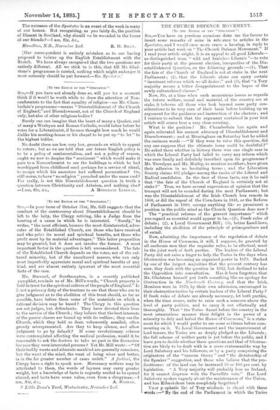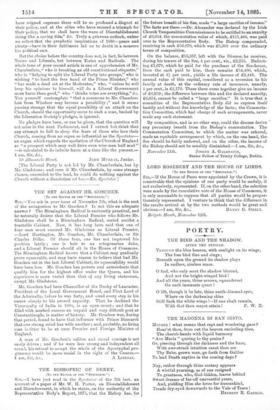THE CHURCH DEFENCE MOVEMENT. [To THE EDITOR OF THE "sescrs.roa."1
SIR,—You have on previous occasions done me the favour to insert some remarks of mine in reference to articles in the Spectator, and I would once more crave a hearing, in reply to your article last week on "The Church Defence Movement." If I read your article aright, it is an appeal to all good Liberals— as distinguished from "wild and brainless Liberals "—to vote for their party at the present election, irrespective of the Dia- establishment Question, on the following grounds :—(1), That the fate of the Church of England is not at stake in the next Parliament ; (2), that the Liberals alone can carry certain "imminent reforms which we all desire ;" and (3), that "a Tory majority means a bitter disappointment to the hopes of the newly enfranchised classes."
Now, Sir, at a time when such momentous issues as regards
the future welfare, moral and material, of the country are at stake, it behoves all those who look beyond mere party con- siderations to be very sure of their basis before building up an argument for the guidance and instruction of the electors ; and I venture to submit that the argument contained in your first article will scarce bear a very close scrutiny.
What is the position ? Mr. Chamberlain has again and
again reiterated his earnest advocacy of Disestablishment and Disendowment ; and at Birmingham on Saturday last he added the ominous words :—" If they were to raise this question, did any one suppose that the ultimate issue could be doubtful P" He asked them whether in history there was one single case in which the Liberal Party had failed to carry any reform which was once finally and definitely inscribed upon its programme ? Mr. Trevelyan and Mr. Morley, to mention no others, have given their adhesion in no hesitating terms ; and the Liberation Society claims 492 pledges among the ranks of the Liberal and Radical candidates. In the face of these facts, can it be said that "the fate of the Church of England is certainly not at stake ?" True, we have several expressions of opinion that the trumpet will not be sounded during the next Parliament ; but was the Disestablishment of the Irish Church less remote in 1868, or did the repeal of the Corn-laws in 1841, or the Reform of Parliament in 1880, occupy anything like so prominent a position in the public mind as the Church Question does now 14 The "practical reforms of the gravest importance" which you regard as essential would appear to be,—(1), Fresh rules of debate ; (2), a Local Government Bill ; (3), better Land.laws, including the abolition of the principle of primogeniture and of entail.
Now, admitting the importance of the regulation of debate in the House of Commons, it will, I suppose, be granted by all moderate men that the requisite rules, to be effectual, must be the joint work of both parties. The leaders of the Liberal Party did not raise a finger to help the Tories in the days when Obstruction was becoming an organised power in 1879. Backed by one of the largest majorities that the present century has seen, they dealt with the question in 1882, but declined to take the Opposition into consultation. Has it been forgotten that Mr. Gladstone himself put forth something like an apology for Obstruction in the Xinxteenth Coelary, and that the Irish. Members were in 1879, by their own admission, encouraged in their obstructive tactics by certain leaders of the Liberal Party ? If fresh rules of debate are already necessary, let both parties, when the time comes, unite to raise such a measure above the level of party politics, and to carry it out effectually and thoroughly. That " the Tories flaunt before the country in the most ostentatious manner their delight in the power of a minority to defy and befool the House of Commons," is a state- ment for which I would prefer to see some evidence before com- menting on it. To Local Government and the improvement of land tenure, the Tories are as deeply pledged as the Liberals ; the full scheme of neither party is yet before the public, and I leave you to decide whether these questions and that of Obstruc- tion are likely to be dealt with in a more statesmanlike way by Lord Salisbury and his followers, or by a party comprising the originators of the "ransom theory" and "the dictatorship of the Speaker" suggestion, and those who believe that the pro- ductivenes of the land can be increased 50 or 100 per cent, by legislation. "A Tory majority will probably lose us Ireland, for it cannot dispense with the Parnellite vote." Has Lord Salisbury spoken vaguely abut the maintenance of the Union, and has Kilmainham been completely forgotten ?
Your p. ophetic list of Tory misdeeds is closed with these
Words :—" By the end of the Parliament in which the Tories have reigned supreme there will be so profound a disgust at their policy, and at the allies who have secured a triumph for their policy, that we shall have the wave of Disestablishment rising like a spring tide," &c. Truly a grievous outlook, unless we reflect that the prophetic inspirations of 1880—peace and plenty—have in their fulfilment led us to doubt in a measure the political seer.
But the choice before the country does not, in fact, lie between Tories and Liberals, but between Tories and Radicals. The whole tone of your second article is one of apprehension of Mr. Chamberlain," who is breaking an old constitutional etiquette," who is "helping to split the Liberal Party into groups," who is wishing "to limit the free hand of the Prime Minister," who "has made a dead set at the Moderates," who, "unless he will keep his opinions to himself, will do a Liberal Government more harm than good," who "thinks votes are everything," &c. You yourself contemplate "that a summons to Mr. Chamber- lain from Windsor may become a possibility ;" and it seems passing strange that the equal possibility of an attack on the Church, should the opportunity occur to such a man, backed by the Liberation Society's pledges, is ignored.
No pledges have been, or can be given, that the question will not arise in the next Parliament, and I cannot but think that any attempt to lull to sleep the fears of those who love their Church, coming from an organ so influential as the Spectator— an organ which regards the spoliation of the Church of England as "a prospect which may well drive even wise men half mad" —is calculated to do infinite harm at a time like the present.— I am, Sir, &c.,
[The Liberal Party is not led by Mr. Chamberlain, but by Mr. Gladstone; and even if Mr. Chamberlain, by some strange chance, succeeded to the lead, he could do nothing against the Church without a dissolution ad hoc.—ED. Spectator.]







































 Previous page
Previous page